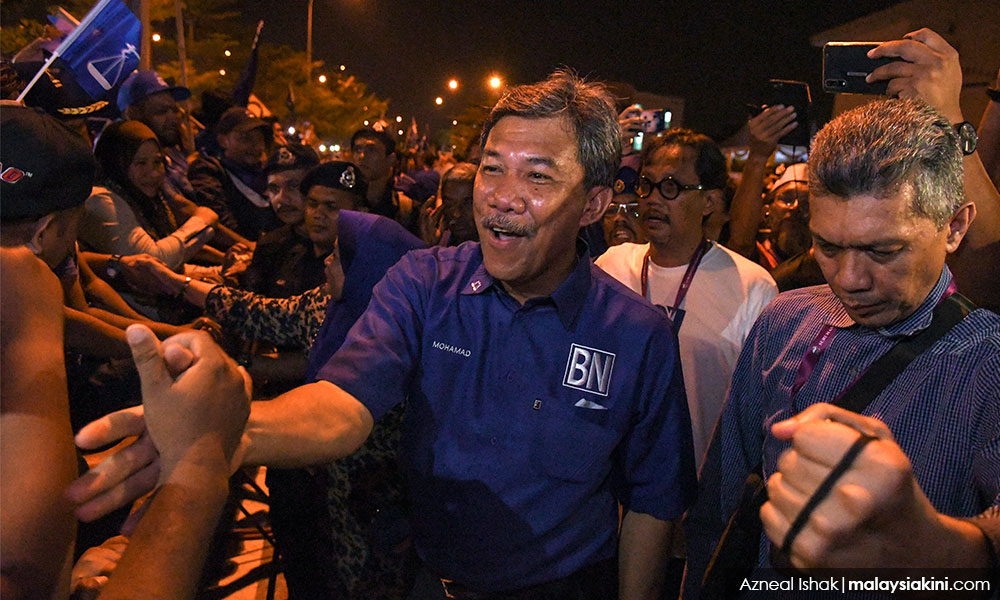
I’m disappointed with last Saturday’s Rantau by-election result because the opportunity to reverse an injustice was not taken.
The incident of Dr S Streram being deliberately denied filling his nomination papers during the May 9 general election last year was an injustice and Streram was its victim.
But I know that this by-election on April 13 was not about that.
I’m also disappointed with the Rantau by-election results because this victory for Umno-PAS validated the strategy of racial fear mongering. The political unity for a cause tenuous and divisive as race and religion is not the Malaysia I wish to see.
But I also know that this by-election, where Umno acting chairperson Mohamad Hasan retained the Rantau state seat in Negeri Sembilan after trouncing Pakatan Harapan's Streram of the PKR, was not about that.
Voters will choose based on what they regard as the imminent threat to their lives. They would entertain concepts like injustice and race-religion fervour, but these are typically not what voters would vote on. It is not because these concepts will never be relevant to the average voter, but because the injustice against Streram (photo, below) and the race-religion political fervour were not imminent threats to voters.
The imminent threat to most Malaysians is the issue of cost of living. Everything else is secondary.

If we understand this, then there is a lower tendency for us to fault the Rantau voters, or to label those who voted for the opposition as indignant, ignorant, or worst, imbecile. Voters are sensible and rational - their votes are always sacred. The only difference is that their calculus is based on what the imminent threat is.
After the Rantau by-election’s loss, many Harapan supporters became disillusioned. They couldn’t believe voters would turn back to Umno-PAS despite all its corrupt history, and they lament by saying it was as if May 9 (2018) did not even take place. Because their assumption was that May 9 changed everyone to be egalitarian, open-minded, integrity-caring voters.
May 9 did happen. And it happened largely not because of any injustice or a desire for race-religion equality. It happened because the imminent threat at that time was the cost of living - and this remains the reason today.
Many research houses have shown this to be true. The issue of cost of living was the reason why voters had chosen to try their hand with a new Harapan coalition, and this reason ranked at least twice as high compared to other issues like corruption and abuse of power.
Elections where race and religion were important
Following this logic, issues like injustice and race-religion will only be the reason for voting when they become an imminent threat. For instance, the election of 1969 and 1974 were elections where race and religion were important because the fabric of their identities were perceived as being under imminent threat.
In 1998, many voters had chosen to vote for the opposition because the grave injustice against Anwar Ibrahim was an imminent threat to how they understand government, fairness, and democracy.
The similar pattern could not be observed in this Rantau by-election. The injustice against Streram, albeit present, was not grave enough to warrant an emotional tug like that of PKR chief Anwar. The 11-month gap between the injustice and the by-election had also dissipated any previous anger against Tok Mat.

Further, the injustice was arguably reversed upon the court decision to nullify the May 9 result and the declaration of the seat vacant. To return the choice back to the hands of the voters was an act of reversing an injustice.
Although I personally feel that a victory at the Rantau by-election would have been a more forceful way of sending a message of justice, I acknowledge that this injustice was not an imminent threat to voters.
When it comes to race and religion, I differ from most people who think that Rantau voters had chosen Tok Mat because they endorse the race-religion narrative by Umno-PAS. I think this is too far-fetched - race and religion were simply not an imminent threat to most voters. If anything, race and religion are only an exacerbating factor to the imminent threat that is the issue of cost of living.
Although there is power in the race-religion propaganda and we should never underestimate how the irresponsible WhatsApp space may be toxic to the minds of many, there is still voter rationality and sensibility. The simple governance of Harapan does not present a constant and everyday threat to the race and religion of voters in Rantau.
The only people who would think that the Rantau by-election victory signals a return of identity politics are the politicians. If Umno-PAS politicians think that identity politics is the mainstream now, then they would risk creating a wreckage in a society they are responsible to heal when they come into power.
If Harapan politicians think that identity politics is the mainstream now, then they would lose significant political capital and goodwill for their economic platform. Under both cases, making a secondary issue primary is poor political calculation. If they are aware of it but continue to harp on it because it is easy, then it is irresponsible.
The elephant in the room is how poorly Harapan is managing the economy. By now everyone understands that it takes time to bring the country back on its feet. But if 11 months is not enough to set a clear direction, plan, and focus for the people, then it’s clear that Rantau was lost because the voters’ imminent threat was not solved.
JAMES CHAI works at a law firm. E-mail him at jameschai.mpuk@gmail.com - Mkini



No comments:
Post a Comment
Note: Only a member of this blog may post a comment.